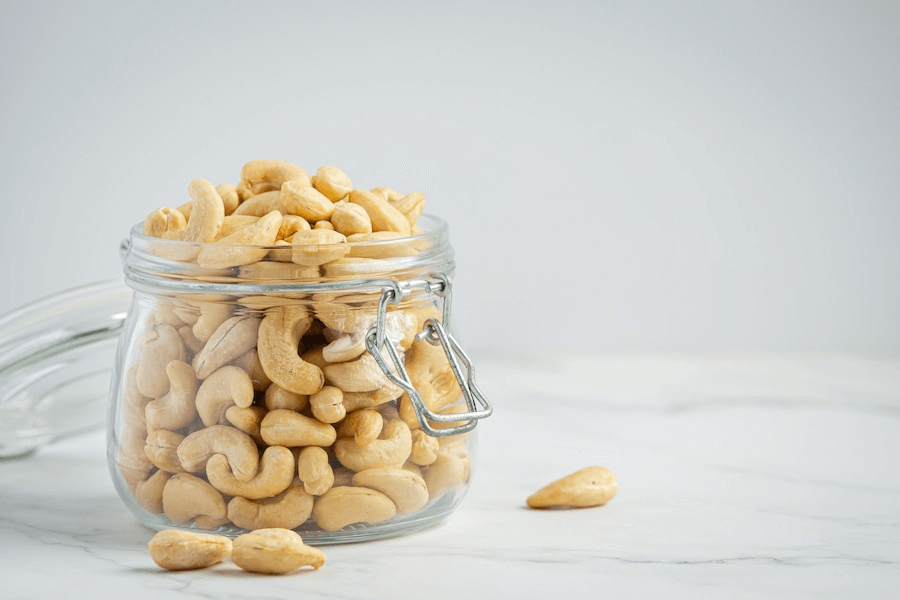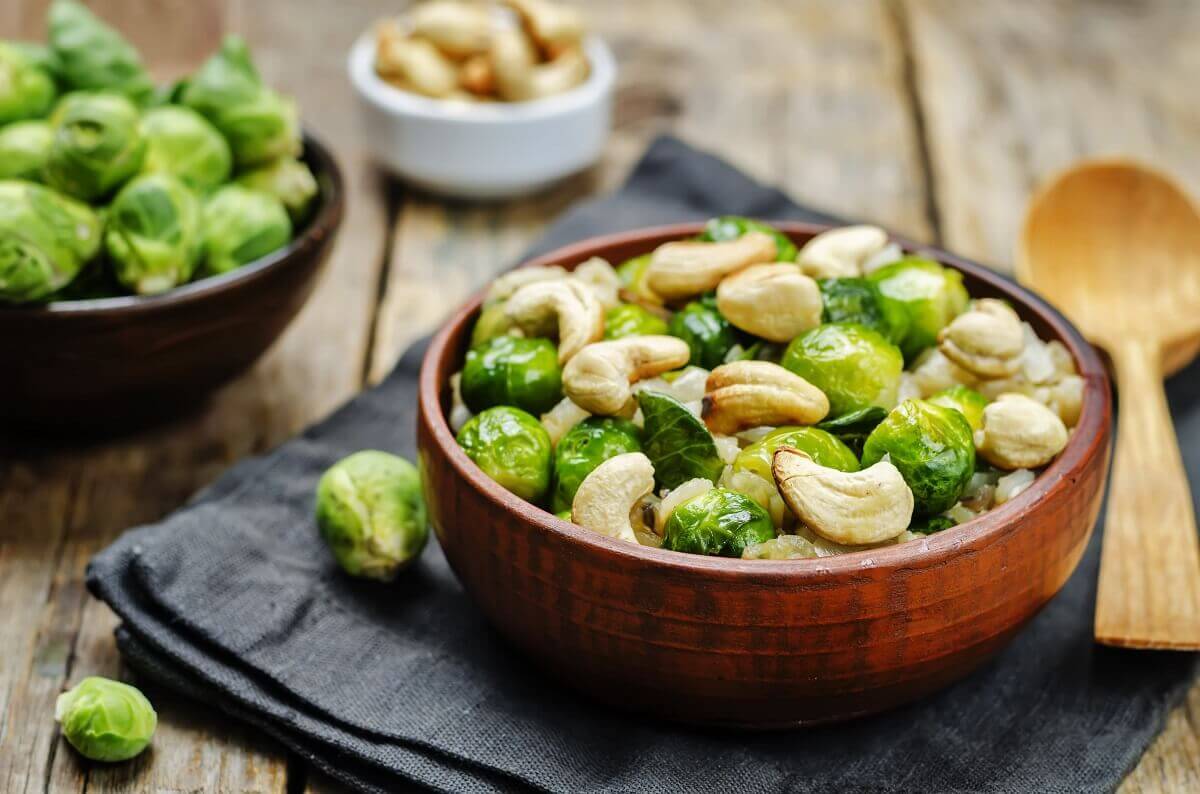Raw cashews immersed in water to germinate or sprout are known as sprouted cashews. This technique decreases phytic acid, which is contained in nuts like cashews and interferes with digestion and mineral absorption. The elimination of phytic acid in sprouted nuts facilitates digestion and increases nutrient absorption.
This article discusses the advantages of eating sprouted cashews and how to sprout them and incorporate them into your diet.

Nutrients in cashews
Cashew nuts are a valuable source of macronutrients, particularly healthy fats, as well as vitamins and phytonutrients, all of which are essential components of a diet high in nutritional value.
According to the National Nutrient Database of the United States Department of Agriculture (USDA), one ounce of cashew nut (28.35 grams) includes the following nutrients:
- 157 calories
- 8.56 g carbohydrate
- 1.68 g sugar
- 0.9 g fiber
- 5.16 g protein
- 12.43 g total fat
- 187 mg of potassium
- 1.89 mg of iron
- 83 mg of magnesium
- 10 mg of calcium
- 168 mg of phosphorus
- 1.64 mg of zinc
- 3 mg of sodium
Cashews also have vitamin C and B, including 7 micrograms (mcg) of DFE folate.
On the other hand, the bioavailability of some minerals, such as zinc, iron, calcium, and magnesium, is decreased when phytate, a particular phytonutrient, is present. Because of this, you may believe that soaking nuts (also known as “activating” them) are a good way to maximize the health advantages of nuts.
Sprouted Cashews vs. Regular Cashew Nuts
Sprouting cashews are cashews that have been soaked in water until they sprout, the first step of plant growth.
Sprouted Cashews: Nutrition benefits
According to research, sprouting some grains and legumes can result in an increase in the levels of antioxidants, amino acids, and B vitamins in the food.
It has also been demonstrated that it lessens the levels of antinutrients like phytic acid, preventing the body from properly absorbing essential nutrients.
However, although some sources suggest that soaking and sprouting nuts boost their nutritious content and decrease phytates, there is no evidence to back up these assertions.
Shelf life of sprouted nuts
Sprouted nuts don’t last as long as raw nuts, and cooked nuts should be eaten within a few days.
Because they are not roasted after sprouting, there is a greater chance that bacteria will grow on them more than the traditional nuts.
According to most sources, sprouted nuts purchased from a store will remain fresh for two to three months in your pantry, or they can be stored in your fridge or freezer to extend their shelf life. Examining the product label for storage suggestions and expiration dates is always the wisest course of action.
It is best to keep nuts with greater oil content, like cashews, almonds, peanuts, and walnuts, in cooler environments, so they do not go rancid.
Sprouted cashews are versatile and can be used in a variety of ways, including as a standalone snack, as an ingredient in other foods (such as smoothies), as a base for homemade granola bars, as plant milk, or nut butter, as a component of dehydrated trail mix, or as a meal or flour in other dishes.
Germination of cashew nuts
Starting with fresh cashew will make the process of cashew germination much simpler.
Instead of buying sprouted cashew in a store or online, you can make them.
However, it is important to remember that eating sprouts in their raw form may increase your chance of getting a foodborne illness. To reduce this danger, you must sprout cashews in a sterile environment and utilize a sterile procedure.
In addition, it is essential to locate “raw” nuts, which have not been processed to eliminate germs, poisons, or mold.
Some common ways to treat nuts, including cashew, are to roast them, blanch them, treat them with methyl bromide, pasteurize them, or irradiate them.
There are two main steps for making homemade sprouted nuts: soaking and sprouting.
How to soak & sprout cashews
Soaking and germination are straightforward processes. Similarly, it is done with nuts, seeds, grains, and beans, all of which require time to fully mature.
Soaking cashew nuts
You can soak them to increase the flavor of cashew, making them more digestible and reducing cooking time. Following the guidelines below will help:
- First, soak cashew in a water bowl for 7 hours or overnight.
- Then, drain the water, rinse, and completely dehydrate the nuts.
- When sufficiently dry, place them in a preheated oven at 250 C for about 1 hour.
Roasting enhances the taste profile, lowers oiliness, and increases the digestion of nuts, however, it is optional for your taste.
Sprouting cashews
After a few cycles of soaking, rinsing, and getting a little air, the nuts will start to grow. This breaks down the enzyme inhibitors even more. At the same time, the nuts let go of their protective shell and release their stored nutrients to prepare for growth.
Note that some nuts, such as cashews, pecans, and walnuts, can’t technically be fully sprouted. Raw almonds are the best candidate for sprouting.
Still, you can soak cashews and other nuts in water as described above, then let them dry out to make them easy to digest and get all their nutrients.
For sprouting, following the guidelines below will help:
- But, first, soak nuts, including cashews, with enough water to cover them and cover them with a light cloth.
- After 10 hours, pour off the water, replace it with fresh water, and soak the nuts for another 10 hours. Continue this process for a total of 48 hours.
- After that, ensure that the cashews are stored in the fridge and consumed within a week since they have a high propensity to get rancid.
Other popular types of sprouted nuts
You may find a wide selection of sprouted nuts at specialty grocery stores, health food stores, and even on the internet. If the shop sells sprouted legumes or grains, you have a better chance of finding sprouted nuts there.
In most cases, sprouted nuts are marketed in the same manner as ordinary nuts, which are either in a bag or a plastic container. In addition, they will have a label that says “sprouted” or “activated,” which indicates that they have completed the first stage of the sprouting process and are ready to be used.
Some of the most popular types of sprouted nuts are:
- Sprouted walnuts
- Sprouted pecans
- Sprouted pistachios
- Sprouted almonds
- Sprouted Brazil nuts
- Sprouted macadamia nuts
- Sprouted hazelnuts
“Sprouted” walnuts, pecans, and other nuts with shells have only gone through the soaking step and can’t be fully sprouted.

Potential risks
Because sprouting needs a moist and humid environment, the nuts are more likely to get bacteria. Also, sprouted nuts are not roasted, which makes them even more likely to have bacteria on them.
Before being packed and sold, commercially sprouted nuts are often dried or dehydrated to avoid mold and foodborne illness.
Because it’s hard to make a clean environment at home, sprouting cashew nuts yourself is usually not a good idea.
Most nuts sold worldwide are not sprouted, especially those easy to get. Instead, nuts sold in stores are often roasted, flavored, or spiced, and their shells may or may not be left on.
Many nuts sold in stores have also been heated to kill bacteria that could make people sick.
Conclusion
Some grains and legumes get more nutrients when sprouted, but there isn’t enough evidence to show that sprout nuts significantly affect their nutritional value.
Still, soaking and sprouting methods are often preferred to facilitate digestion, reduce cooking time, and increase flavor profile.
Some kinds of sprouted nuts can be bought in stores or online, or you can make them home. You can eat them as they are, put them in your food and smoothie recipes, or dry them to make flour.
Questions & Answers
Can cashews be sprouted?
The following nuts can’t be fully sprouted: Brazil nuts, cashews, hazelnuts, macadamias, pecans, pistachios, and walnuts.
How long does it take to sprout cashews?
The soaking time of cashews is 2-4 days. They cannot be sprouted.
How do you sprout cashews at home?
Although soaking contributes to the digestion, flavor, and cooking time of cashews; Cashews technically cannot be completely sprouted.


